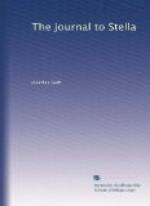3 In a letter to Swift, of March 17, 1711, King said that it might have been thought that Guiscard’s attack would have convinced the world that Harley was not in the French interest; but it did not have that effect with all, for some whispered the case of Fenius Rufus and Scevinus in the 15th book of Tacitus: “Accensis indicibus ad prodendum Fenium Rufum, quem eundem conscium et inquisitorem non tolerabant.” Next month Swift told King that it was reported that the Archbishop had applied this passage in a speech made to his clergy, and explained at some length the steps he had taken to prevent the story being published in the Postboy. King thanked Swift for this action, explaining that he had been arguing on Harley’s behalf when someone instanced the story of Rufus.
4 A Tory paper, published thrice weekly by Abel Roper.
5 Sir Charles Duncombe, banker, died on April 9, 1711. The first wife of the Duke of Argyle (see Letter 11, note 57) was Duncombe’s niece, Mary Browne, daughter of Ursula Duncombe and Thomas Browne, of St. Margaret’s, Westminster. Duncombe was elected Lord Mayor in 1700, and was the richest commoner in England.
6 The Rev. Dillon Ashe (see Letter 12, note 23).
7 John, fourth Baron Poulett, was created Earl Poulett in 17O6, after serving as one of the Commissioners for the Treaty of Union with Scotland. From August 1710 to May 1711 he was First Lord of the Treasury, and from June 1711 to August 1714 he was Lord Steward of the Household.
8 Lost or stupid person.
9 Sir William Read, a quack who advertised largely in the Tatler and other papers. He was satirised in No. 547 of the Spectator. In 17O5 he was knighted for his services in curing many seamen and soldiers of blindness gratis, and he was appointed Oculist in Ordinary to the Queen. Read died in 1715, but his business was continued by his widow.
10 General John Webb was not on good terms with Marlborough. He was a Tory, and had gained distinction in the war at Wynendale (17O8), though the Duke’s secretary gave the credit, in the despatch, to Cadogan. There is a well-known account of Webb in Thackeray’s Esmond. He was severely wounded at Malplaquet in 17O9, and in 1710 was given the governorship of the Isle of Wight. He died in 1724.
11 Henry Campion, M.P. for Penryn, is mentioned in the Political State for February 1712 as one of the leading men of the October Club. Campion seems to have been Member, not for Penryn, but for Bossiney.
12 See Letter 3, note 32.
13 Sir George Beaumont, Bart., M.P. for Leicester, and an acquaintance of Swift’s mother, was made a Commissioner of the Privy Seal in 1712, and one of the Lords of the Admiralty in 1714. He died in 1737.
14 Heneage Finch, afterwards second Earl of Aylesford, was the son of Heneage Finch, the chief counsel for the seven bishops, who was created Baron Guernsey in 1703, and Earl of Aylesford in 1714.




